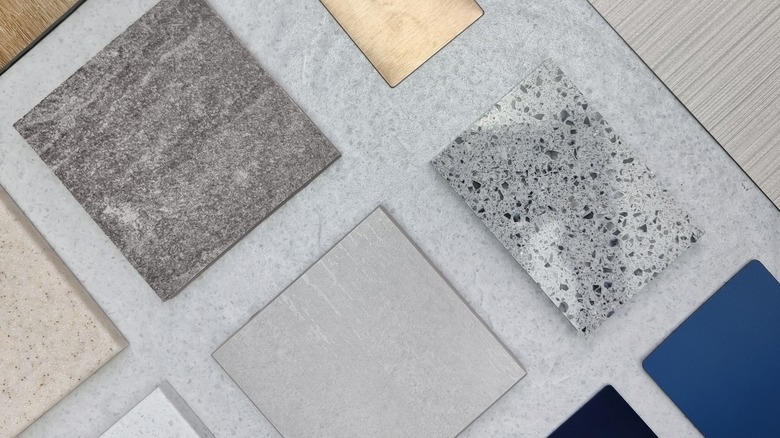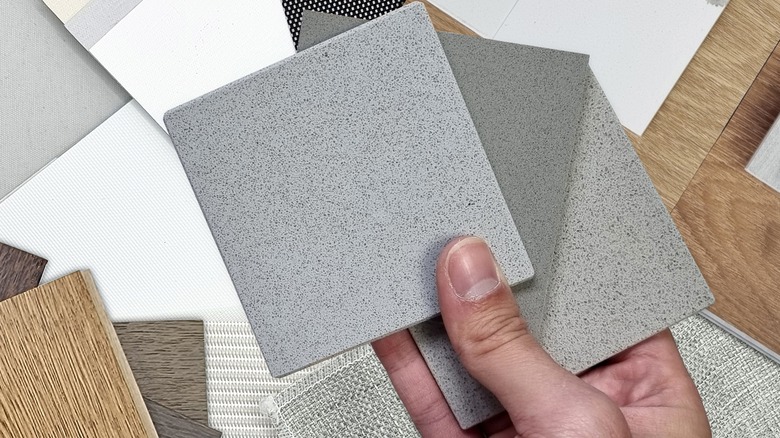The Flooring Material You Should Consider If You Want The Look Of Stone But Not The Cost
Picking out a home is tough, and just when you think the hard part is over, you need to decorate and pay for the new interior. Flooring is one of the first things to design, and if you're looking at stonework, get ready to shell out the big bucks. You'll be spending anything from $8 to $47 per square foot. Unless you have a stone quarry in your backyard, you may be better off using a vinyl material that will give you the look of stone without the extravagant cost.
Laying your floor with real hewn stone is no easy feat, and with the numerous benefits of stone floors, it's no wonder they cost an arm and a leg. It's heartbreaking to see a flawless stone flooring design you love, only to discover that the price tag has more zeroes than a binary code. At the rate of about $2.50 to $13 per square foot, vinyl stone flooring is a more feasible alternative that won't wreck your pocket. It is made of photographic images of stone patterns realistically captured on vinyl and cut into planks or tiles. You can find just about any type of stone texture on vinyl, from limestone to granite to marble.
Vinyl stone floors can range in cost depending on quality
Stone is rustic and timeless, but vinyl stone flooring can achieve the look at a cheaper rate — and there are plenty of types and styles to choose from. Luxury vinyl tiles are more expensive than the standard version or sheet vinyl. They're thicker, feel more natural underfoot, and can even contain stone particles. With the embossing quality and superior workmanship that goes into making them, expect to pay around $4 to $13 per square foot plus installation. Alterna tiles are engineered with 75% limestone and retail for around $4 per square foot. They're grout and stain-repellent. They also take cues from real stone and don't repeat patterns.
Sheet vinyl and vinyl tiles are made from thin PVC material, but sheet vinyl comes as a sheet and is cut according to your needs. One sheet can cover your entire room, so you likely won't have seams like vinyl floor tiles do. This makes it impervious to water and mold-resistant, but also hard to repair if damaged. Vinyl tiles, on the other hand, are laid individually, and so are not mold-resistant, unfortunately, but easily repairable. Sheet vinyl would require professional installation, which amounts to $2.50 to $8.50 with the materials, and is generally cheaper than the tiles that you can easily DIY, which cost $2 to $11.
You have the option of various stone designs
Once you've selected the vinyl material that works best for you, you can then select the stone design you want. Marble is a popular choice for luxury vinyl and can come in warm and cool colors and swirls. Granite is another sought-after design that provides a dark, even-tempered, sophisticated look. Limestone is one of the warmer designs with a creamy look that would go splendidly with brown walls. These designs exist in many patterns, such as mosaics or interlocking stones, and come in various colors.
The benefits of vinyl flooring are endless. Aside from being affordable, vinyl stone floors offer more cushion and insulation than stone during the winter because of the many layers that make it up. These floors are also low-maintenance, and you can get away with just sweeping and mopping them. The downside is that they can't be refinished like real stone floors and would have to be replaced if significant damage is incurred. Nevertheless, you can avoid this by properly caring for and cleaning your vinyl flooring.


